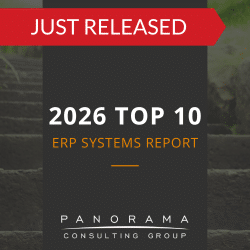You’ve heard us say time and time again that no ERP implementation is successful without focused, comprehensive end-user training. No matter how bright you think your people are, no matter how adaptive everyone is to changes and new technologies, there just is no way of getting around it: your staff needs to be trained and then trained again and finally trained some more. Following are a handful of tips to help get your training program off the ground:
- Allocate enough time. As our research reports always show, ERP initiatives frequently go over both budget and anticipated duration. By the time training roles around, organizations can be in a rush to get the project done and behind them. Unfortunately, this is the worst time to start cutting corners. Plan to begin training at least 60 days before the ERP system switchover.
- Leverage internal resources. Your super-users and subject-matter experts are critical to training success; they know all the ins and outs of the system, the organization and many of the people in the training classes and likely will be effective communicators of important information. Make them key players in the process.
- Variety is the spice of training. Taking a rote approach to ERP training is not the way to go. To be most effective, build up your program with several different types of formal and informal training. Options to consider include classroom training, online tutorials, self-study, cheat sheets, hands-on simulations and interactive distance learning.
- Connect the new to the old. Rather than throwing enormous amounts of new information at your employees cold, create context by showing them how the new business processes are related to the old. By creating a before and after set-up, you’ll be able to highlight the many benefits of the new ERP system and make staff feel more positive about the changes in general.
- Get your OCM working overtime. Your implementation needs to be enveloped in organizational change management activities long before training begins. An environment where discussions are welcome, communications are frequent, and executives are energized and engaged is an environment ripe for training. Organizations that wait to “spill all” during training rather than dispersing information as it becomes available, often overwhelm and frustrate the very people they need to make the initiative a success: their employees.
Nobody ever said this stuff was easy, but there are proven tactics to make it a little less taxing. Read more about our organizational change management and ERP benefits realization service offerings to learn more about how we can help make your implementation, training and cutover go smoothly.













